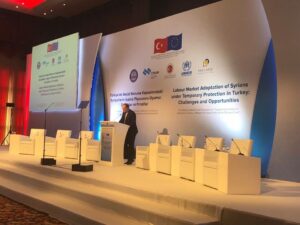Better Work Jordan participated in the “Labour Adaptation of Syrians under Temporary Protection in Turkey: Challenges and Opportunities” conference on Friday May 11, 2018 in Istanbul, Turkey. The event was organized by the Turkish Government, the United Nations High Commissioner for Refugees-Turkey, the European Union Delegation, and the Fair Labour Association. It aimed to highlight best practices and policy reform with regards to the integration of Syrians under temporary protections into the Turkish labour market, contributing to economic growth, and challenges and opportunities in the labour market.
Representatives of public institutions and the private sector participated in the conference, which commenced with opening remarks by Sharon Waxman, Fair Labour Association President; Katharina Lumpp, United Nations High Commissioner for Refugees-Turkey Representative; Christian Berger, Head of the European Union Delegation; Jülide Sarieroğlu, Minister of Labour and Social Security; Nihat Zeybekçi, Minister of Economy; and Süleyman Soylu, Minister of Interior.

In his briefing speech, Hakan Yurdakul, Head of the Economy Monitoring Board at Presidency of the Republic of Turkey explained that while Turkey’s role among other countries was initially addressing humanitarian needs, the country has increasingly shifted their focus towards employment and livelihoods support.
Turkey is currently home to an estimated 3.5 million Syrian refugees, and the country is fully committed to the provision of safe living conditions, in addition to education and employment opportunities, to all members of this demographic. However, there are challenges in the form of taxes, social security, and the language barrier.
The conference hosted four sessions including a session on the perspective of public institutions and international organizations, the perspective of workers’ and employers’ organizations, and the perspective of international brands, which featured Puma, Adidas, H&M, Inditex, C&A, and ASOS.
The conference featured a special session on Jordan, which included presentations by Hamdan Yacoub, Head of the Syrian Refugee Department at the Ministry of Labour in Jordan who said: “We are proud of our accomplishments to safeguard the employment rights and opportunities of Syrian refugees and locals in Jordan. We are more than happy to share our experiences in this matter to create even more interactive approaches in dealing with labour issues and promoting the economy.”
Yacoub also highlighted the role of the Jordanian government in the response to the Syrian refugee crisis in terms of providing fundamental humanitarian services and livelihoods to Syrian refugees. “I would like to recognize the distinguished efforts of our strategic partners represented by the International Labor Organization, United Nations High Commissioner for Refugees, and the active role of international parties in promoting the economy and development,” shared Yacoub. He also praised the Turkish government on their role and experience in the context and the importance of exchanging experiences and lessons learned.
Laura Buffoni, United Nations High Commissioner for Refugees-Jordan, Senior Livelihoods Manager, who also participated in the session explained, “In Jordan we have between six to seven thousand refugees working in manufacturing, in both small to medium enterprises and larger scale factories, this is a real success for the international community. The presence of refugees in the workforce can be an asset.”
At the conference, Tareq AbuQaoud, Programme Manager at Better Work Jordan, a joint programme between the International Labour Organization and the International Finance Corporation, took the opportunity to share the work of his programme in the integration and subsequent employment of the Syrian refugee community in Jordan. AbuQaoud highlighted the organization’s role in promoting decent working conditions for all by supporting national stakeholders and engaging with local exporting factories, in addition to facilitating public-private dialogue with national and international organizations.